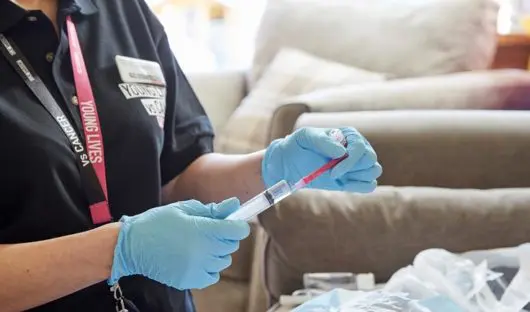Where will I have my treatment and do I get a say?
Different things will determine where you have your treatment. Usually, it's to do with your age, the type of cancer you have and the services that are available near you. You might not always get to choose but you should be able to ask about your options and explore what the alternatives are.
Why getting care that’s right for your age is important
Being diagnosed as a teenager or young adult isn’t the same as getting cancer in later life. You will have needs that require special knowledge and skill. This might be your medical needs but it’s also about the stuff that’s going on in your life – like your education, work, relationships, emotions, and the role your family plays in your life.
Because of this, the NHS says that there should be cancer services especially for teenagers and young adults (TYA for short). These services are aimed at young people between the ages of 16 and 24.
Where will I get treatment and how is it decided?
Where you have treatment will depend on a number of things like your age, where you live, recommendations from your consultant and which hospital has the expertise to give you the best possible care.
Your treatment should be at a Principal Treatment Centre (PTC) for young people. These are hospitals that are experts in teenage and young adult cancer. It might not be the hospital that’s closest to your home but it’s the one that’s qualified to give you the best treatment.
You should have the option of having your treatment at a PTC. Or, you could choose a hospital that’s been approved to provide cancer care for young adults. This care would be given within its normal cancer services for adults.
But what does that actually mean though?
The UK isn’t exactly overflowing with PTCs. They’re specialist centres, so they provide exceptional care – but there’s not many of them around. Choosing to be treated at another hospital near you means you won’t have to travel long distances for treatment.
Some hospitals have teenage and young adult cancer ‘dedicated units’. They work in partnership with PTCs to give age-appropriate care. If there is a dedicated unit near you, then you pretty much get the best of both worlds. You’ll get the care you need in a younger environment – and closer to home.
If your local hospital says they can treat you as an adult patient, the chances are you’ll be on a cancer ward (usually grouped by types of cancer) with a bunch of people who are likely to be significantly older than you. When you weigh it up, this might not be too much of a concern if your main agenda is being close to home. But it’s something to bear in mind. Also, be sure to check that your consultant is aware of Young Lives vs Cancer and is in touch with specialists at a PTC.
Do I have a say in what happens?
Yes. You always have a say. It might not feel like you do – and that decisions are being made for you. And it’s true that sometimes you won’t have a choice over certain elements. But you should always be able to say, “Stop. I don’t understand. Explain to me why things are happening this way.” This will you to understand why certain decisions are being made – and if you have a choice, it will help you to determine what the options are and get your views heard.
If you feel like you aren’t being listened to by your consultant, tell them. Or ask someone to come in with you and back you up. If things still aren’t better, there are people you can talk to at your hospital:
- Patient Advice and Liaison Service (PALS) in England
- Patient Advice and Support Service (PASS) in Scotland
- Your local health and social care trust’s complaints manager in Northern Ireland.
You have a right for your voice to be heard.
Will I have to stay in hospital all the time?
Some of your treatment may be on an outpatient basis – that is, you will turn up to the hospital clinic for your treatment and then go home the same day. Other times you may need to stay in hospital for a while as an inpatient.
For more details, it’s best to ask your doctors and nurses to explain what is happening, who can provide your treatment, and what your options are.
What care should I expect?
You should receive high-quality care wherever this is provided, and no matter how old you are. You can read more about this in the NHS guide for teenagers and young adults.


